Atlantic Monthly Contributors's Blog, page 413
June 15, 2015
Could the Next James Bond Be Black?

In Britain, a beloved institution is facing calls for a radical overhaul. No, not the monarchy, or the House of Lords, or the BBC, or even the unwritten constitution. The pillar of culture currently being agonized over, upon which the nation’s identity rests, is instead the question of which actor might be chosen to play the next James Bond. Will Brits finally be ready to cast aside old prejudices and embrace diversity? Might the next 007 be … a redhead?
Related Story
The Increasing Batmanization of Bond Movies
For several years now, rumor has had it that the next actor to play the hard-drinking, womanizing MI6 agent might be Idris Elba, the London-born actor best known for his roles as Stringer Bell in The Wire and Nelson Mandela in Mandela: Long Walk to Freedom. Much of this conjecture has manifested in betting offices, as most decisions of national consequence do. Most recently, Elba’s odds at the bookmaker William Hill are 5/2, making him the favorite in a race that also includes the Man of Steel actor Henry Cavill (7/1) and The Walking Dead’s Andrew Lincoln (14/1). But in recent days, odds have shortened considerably on the Homeland and Wolf Hall star Damian Lewis, prompting media speculation that he’s “in the running” to take on the role.
Never mind that the current Bond, Daniel Craig, has a contract that locks him in for another film after the upcoming Spectre. As it always has, the British press treats any rumor about the next 007 with the kind of hysteria usually reserved for the birth of a future king, or the choosing of a new Pope. The fictional MI6 spy is still one of the country's most popular exports, hence the handwringing that goes on whenever change is discussed. Any fuss about Lewis’s red hair would echo the outcry Daniel Craig weathered ten years ago as the first strawberry-blonde Bond (promptly silenced by the release of the acclaimed Casino Royale). But with Elba, the debate enters much more sensitive territory, as the franchise’s reactionary fan base wrestles with the possibility that the next 007 might not be white.
There’s no real evidence that Elba will get the job—he’ll be in his mid-to-late 40s by the time the role becomes available, which is a little long in the tooth for a role that typically ends up dominating an actor's career for at least a decade. Elba himself has said the longstanding rumor, which started when Craig touted his suitability for the role, has no viability, but that hasn’t stopped some fans from expressing hope that the next Bond could represent a real departure from Ian Fleming’s original creation. Nor has it stopped celebrities associated with the franchise from airing their opinions on the matter.
Brits are so touchy about who plays Bond that serious complaints arose about Daniel Craig's casting because of his hair color.Roger Moore, who played James Bond in seven films, reportedly told Paris Match earlier this year that Bond should be “English-English,” adding, “A few years ago, I said that Cuba Gooding Jr. would make an excellent Bond, but it was a joke!” Moore disputed Paris-Match's account of the interview on Twitter without clarifying just what he meant, but it's an unfortunately common sentiment (never mind the fact that Elba, who was born in Hackney, is more “English-English” than half the other actors who’ve taken the role). Yaphet Kotto, who played the Bond series’s only black villain in 1973’s Live and Let Die, told The Big Issue that “political correctness be damned,” Bond could never be played by a non-white actor: “He was established by Ian Fleming as a white character, played by white actors. It’s silly. Play 003 or 006 but you cannot be 007.”
The Bond rumor mill has always played out this way: a mix of fairly safe choices (i.e. any British action star of a certain age, a list that right now includes Tom Hardy and Michael Fassbender as well as Cavill and Lincoln) and slightly more left-field options. For years, the black actor Colin Salmon, who played a minor role in three Bond films, was floated as a possible successor to Pierce Brosnan by the bookies, a rumor encouraged by Brosnan himself. Again, there was no real evidence that the people in charge of this decision—the producers Michael G. Wilson and Barbara Broccoli—seriously considered Salmon, but the rumor seemed to serve as an intended salve to any complaints about the character’s homogeny. The same debate surrounds the casting process for another beloved British character, Doctor Who: Bookies repeatedly raised hopes for Paterson Joseph, an accomplished black actor, but the new Doctor always ends up being a white guy (David Tennant, Matt Smith, and now Peter Capaldi).
Amid all this, it’s worth remembering that Brits are so touchy about who plays Bond that serious complaints arose about Daniel Craig's casting because of his hair color. Forget that Roger Moore’s sandy mop didn't match Fleming’s description of Bond's black hair; Craig was “the first blonde Bond,” and there was enough uproar over his replacing the more classically handsome Brosnan that a subset of fans swore they would boycott his films. Ten years removed from his casting, the fuss about Craig seems ridiculous, and it’s hard to imagine a public outcry if Lewis really did sign on to the franchise. But the same can’t be said for what could happen if the producers defied change-averse Brits to make a truly bold casting decision.









The Mononymy Trap

Run, Hillary, Run.
Stand With Rand.
Jeb!
Every election seems to crystallize around a theme. It’s early yet, but could the theme of 2016 be mononymy?
That’s the formal term for the use of a single name, and it’s unusually popular with this year’s presidential hopefuls, with three leading contenders branding themselves sans surnames. Hillary Clinton has been using only her first name since she launched her own political career with a campaign for Senate in New York in 2000. She’s joined by Rand Paul, the senator from Kentucky. And over the weekend, Jeb Bush revealed his own logo for the 2016 race: Jeb!, with the exclamation mark included. He, too, has used that moniker before, in his races for Florida governor.
Perhaps this is just the symptom of an informal age—a time when people naturally gravitate toward unearned familiarity, when strangers and telemarketers address us by our first names or (shudder) Twitter handles, and when politicians can dispense with even the most basic formality and send us a Snapchat directly. Yet there remains something of a stigma against the practice. Manners curmudgeons still
It's Okay to Call Her 'Hillary'
Hillary has been grappling with the dilemmas of nomenclature for decades now. During the 2000 campaign, her logo simply read “Hillary.” It was a time when Democratic politicians weren’t quite sure what to do with the Clinton name—Al Gore, the party’s nominee for president that year, ran away from it, only to be criticized later on. When Hillary Clinton launched her presidential bid in 2007, she again stuck with her given name, a decision that Candid Camera’s Peter Funt—of all people!—mused on in The New York Times. This time around, her logo is a simple “H” with an arrow, but the nickname is firmly entrenched by now.
Last year, my colleague Peter Beinart made the case for journalists to call her “Hillary” too. For one thing, it’s simply much easier: “Clinton” could mean Hillary or Bill. And he rebutted critics who claim it’s sexist and patronizing, noting that Hillary herself had pushed the name.
It’s undeniable, though, that Hillary Clinton’s name has long been a battlefield in the conflict over feminism and naming. When she married Bill Clinton, Hillary Rodham opted to keep her maiden name—a controversial choice in 1970s Arkansas. It was only during Bill’s 1982 comeback campaign (he’d been tossed from the governor’s office after one term) that she decided that political expediency bested personal pride, and she became Hillary Clinton. During Bill’s 1992 campaign, she opted for the comprehensive “Hillary Rodham Clinton.” But that’s quite a mouthful—and if, like Hillary, you were a candidate who’s sometimes been criticized for being distant and remote, perhaps you’d avoid a seven-syllable introduction, too.
The best reason to be skeptical of using a first name alone is a quick review of what has happened to candidates abroad who have used it. Take Luiz Inacio da Silva, the former Brazilian president more commonly known as “Lula.” Sure, he was wildly popular when in office; but now his successor is embattled, the economy is tanking, and the apparatus he set up seems riddled with corruption. Or look to Britain, where Tony Blair cemented his “Cool Britannia” takeover by declaring at his first cabinet meeting that he was eschewing with formal titles: “Just call me Tony.” How’d that work out? Blair left office widely disliked, his party is still lost in the political wilderness, and the members of Oasis still can’t stand each other. Perhaps he or she who has a last name gets the last word.









Rachel Dolezal and the History of Passing for Black

On Monday, Rachel Dolezal resigned from her post as president of the Spokane, Washington, NAACP. It capped a tumultuous week for Dolezal, after the Spokane Spokesman-Review reported claims that she had “been falsely portraying herself as black for years.” Her parents volunteered photos of her as a young woman that contrasted sharply with her current self-presentation. Asked for an explanation, Dolezal told one reporter, “We’re all from the African continent.” Critics charged that Dolezal, who also teaches Africana studies at Eastern Washington University and chairs Spokane’s Police Ombudsman’s Commission, had also fabricated or exaggerated incidents she had reported as hate crimes.
In a statement on Monday announcing her resignation, Dolezal reaffirmed her belief that “challenging the construct of race is at the core of evolving human consciousness,” while voicing concern that “the dialogue has unexpectedly shifted internationally to my personal identity in the context of defining race and ethnicity.”
The allegations prompted reflections on gaining the benefits of blackness without its burdens, on how Dolezal had taken advantage of the black community’s tradition of acceptance, and the constructed nature of race.
One reason the story may have drawn so much attention was its inversion of the classic narrative of racial passing, in which African Americans seek to evade racial discrimination by presenting themselves as white. But passing for black, it turns out, has its own complicated history. To find out more, I turned to Baz Dreisinger, an associate professor of English at John Jay College of Criminal Justice, and author of Near Black: White-to-Black Passing in American Culture.
The following transcript has been edited and condensed for clarity.
Yoni Appelbaum: What are the earliest cases in the historical or literary record of white people passing for black?
Baz Dreisinger: The earliest cases that I look at are from the slave era. There are cases of white people who are kidnapped and sold into slavery, and which therefore are cases of involuntary passing. There’s also a fictional account by Mark Twain, Pudd’nhead Wilson, about two brothers, one slave and one free, who are switched at birth. That’s as early as I’ve located.
“The concept of white passing is actually born more out of anxiety than fantasy.”Appelbaum: So that’s involuntary. In the early nineteenth century, it’s almost more of a nightmare than a fantasy.
Dreisinger: The concept of white passing is actually born more out of anxiety than fantasy. I use the concept of proximity in my book a lot—hence the title, Near Black—that closeness to blackness has the potential to turn one black. You have post-slavery scenarios involving anxiety around the lack of slave/free distinctions between people, because if you don’t have this slave/free divide, then what is to separate poor white from black? So these nightmares, these anxious scenarios, in which white people end up becoming black in a terrifying way for them, both real and fictional.
Appelbaum: In Jazz Age cities, whites and blacks mixed together, particularly in nightclubs and other musical venues. And that interaction opened the way for a new kind of mixing. Why did that happen?
Dreisinger: There has always been within White America a kind of fetishizing of blackness, and of things associated with black culture, with music, and so on. So you have cases of non-black people engaging with those activities, particularly with music, who are passing themselves off—whether for a period of time, whether for life—in many different contexts. Whether actively passing, or just not refuting what they’re getting taken as, in the context of music. And the fantasy becomes, if you’re close enough to black culture, in the literal or metaphorical sense, then you can somehow become black.
“[In] the cultural domain, it certainly can be advantageous to pass as black.”Appelbaum: In mixed marriages through the middle of the twentieth century, you’ve written, the white spouses often found it simplest to pass as black, so as to have their marriages accepted. Were there other circumstances in which passing for black might have been advantageous?
Dreisinger: Anytime you’re talking about the cultural domain, it certainly can be advantageous to pass as black. In many ways, particularly when you’re talking about the discourse around authenticity in jazz, the most authentic jazz players had to be black. And so if you’re a white jazz player who believes that—and that’s the paradoxical irony of being a white jazz musician, is that many of them were quite traditional in their sense that it’s an authentically black music, and so a black person must play it—but what do I do, because I’m not black?
Certainly, then, because we’re talking about the era of Jim Crow, that means subjecting yourself to all kinds of racism and segregation and putting yourself in that boat, but ultimately it’s an advantageous thing from the perspective of authenticity within the arts.
Appelbaum: There are two constructed notions of race interacting in each of these cases, though, because to pass as black means to reject another, prior identity. What do these cases tell us about what it means to be white?
Dreisinger: The notion at the beginning of the phenomenon of white passing is that whiteness is a dangerously at-risk entity, that it can become black at any point. And again, this goes back to the anxieties surrounding nineteenth-century scenarios of passing, that whiteness is vulnerable, that with too much contact with blackness in any capacity it can get lost, it’s weak, it can be taken off.
That changes, with time, as white passing becomes advantageous, and whiteness becomes a much more stubborn entity that can’t be gotten rid of so easily, and requires a lot of finesse.
“Is it not possible to identify with a culture, to adopt elements of it, to believe in pushing for racial justice without having to pass?”Appelbaum: The case of Rachel Dolezal has received enormous attention. Is there a way in which this broader context ought to inform our understanding of it?
Dreisinger: Definitely. For one, it is important to recognize that her passing does have a history—it’s not just this lone incident, which is often how it’s being portrayed. Not to say that this history is as deeply rooted in American history as the traditional form of passing. I’m not the only one who’s written about it. But my book is as much about racial appropriation as it is about racial passing, and racial cross-identification, or what she’s calling “trans-raciality.”
I think it’s critical to recognize the ways in which American whites have a long legacy of fetishizing blackness, whether they’re literally passing or not, but the ways in which their notions of blackness are based upon caricatures, and not characters. They’re based on idealized or cartoonish notions of what blackness is.
Appelbaum: And Dolezal?
Dreisinger: We haven’t heard from her, but some of the discussion is obscuring the potential touchstone moments here and the potential for talking in a really serious intellectual way about the concept of trans-raciality, and about the one-drop rule, and about how malleable and subject to perception race is in American culture.
The last thing I would say is that it’s disappointing that it seems to be that Rachel couldn’t envision a cross-racial identification or a cross-cultural identification that didn’t involve passing and what’s being called “blackface” or the performance of blackness. Is it not possible to identify with a culture, to adopt elements of it, to believe in pushing for racial justice without having to pass? It erases the possibility of a cross-racial identification that transcends racial lines. And that’s an unfortunate thing.
All of the work she did as a “black woman,” she could have done as a white woman. And in some ways, maybe that would be more radical, because it’d be a statement that, “I don’t have to be it, to be of it.”









The Perma-Pump: Jurassic World's Silliest Character

High heels work the way they do not just because of aesthetics—the lengthening of a body, the curving of a leg—but also because of physics. To stay balanced on heels, be they stiletto-ed or kitten-ed or something in between—to walk upon spikes, essentially, successfully and safely—one must shift one’s center of gravity, stride after stride, so that the back is arched, the shoulders are stretched, and the pelvis is thrust forward. You slink and you sway; if you don’t, you will slip. Heels are delicate, and they are dangerous, and those two things, working together, are the source of their appeal.
I mention that because of Jurassic World. Which stars not just sinewy humans and slobbery dinosaurs, but also, bizarrely, another arbitrary product of Earth’s evolution: a pair of high heels. The shoes in question are the distinctly Middleton-esque nude stilettos that, against all odds, never leave the feet of Claire Dearing (Bryce Dallas Howard), the operations manager of the Jurassic franchise’s latest dino-themed pleasure park. While fleeing Indominus rex, an especially terrible species of terrible lizard, Claire runs across floors of slick stone and grounds of moist mud. She sprints and leaps and crouches. She drives an ambulance. She shoots a gun. She saves some lives. She takes some others. She grows as a person, and as A Woman. And she does it all in ridiculously spiked heels that you really, really hope are decked out with a good pair of DreamWalk™ Comfort Insoles.
Related Story
Jurassic Worl: Come for the Dinosaurs
This, of course, is absurd. And it is so obviously absurd that Claire's perma-pumps are the source of a running joke within Jurassic World, manifested both through dialogue—Owen Grady (Chris Pratt) at one point explicitly mocks Claire’s entire flee-unfriendly outfit, which results in her removing clothing, but not swapping shoes—and through ponderous, slow-mo shots. Claire’s flimsy footwear has become a joke outside the film, too. Pratt, during the publicity tour for the movie, made a dubious tribute to his co-star by way of prancing around in a pair of patent leather pumps.
The presence of these vaguely retrograde shoes in this vaguely futuristic film has also come in for complaints from commenters across the Internet, who have generally characterized the impractical footwear as yet another example of Jurassic World’s Woman Problem, in a movie that has long been criticized for its sexism. As The Dissolve put it, “The film’s script utilizes Claire’s wardrobe to tell a part of its story—and to make a joke—but it doesn’t go all the way with it. In this one tiny but maddening detail, Jurassic World sets itself up to fail.”
So, okay. Let’s stipulate what will be obvious to any human who has ever had the need to walk/run/move in a pair of stilettos: Claire’s shoes are definitely among the more ridiculous things in a movie whose plot revolves around the emotional inconsistencies of de-extincted dinosaurs. And, while we’re at it, let’s also go ahead and acknowledge that Jurassic World’s smashing of its way through the box office to enjoy the biggest opening weekend of all time means, among so much else, that a significant swath of humanity has now watched a woman who is supposed to be smart doing something supremely stupid: fleeing an impossible animal in impractical shoes.
Those things given: Does it matter? Is Claire’s footwear merely another innocuous flaw in a movie that is full of them, or is it pernicious in a more significant way? Does the film’s literal elevation of its female protagonist end up, figuratively, diminishing her? Does Jurassic World have … a Shoe Problem?
Does the film’s literal elevation of its female protagonist end up, figuratively, diminishing her?On the one hand (or, I guess, the one foot): Yes, totally. Heels embody the blithe double standards women have long had to deal with, in Hollywood and elsewhere: the familiar stuff of “bossiness” versus “assertiveness,” “dried-up” versus “distinguished,” etc. Elevated shoes, which both slow down and sex up that most basic of things—a person’s movement through the world—suggest that women have to work harder to do the same things men do, whether the thing in question involves advancing a career or escaping a pissed-off pterosaur. The shoes suggest, at the same time, that this discrepancy isn’t unfair so much as, like a pissed-off pterosaur, just part of the natural order of things. Ginger Rogers did everything Fred Astaire did, the old saying goes, only backwards and in heels.
In that sense, it’s telling that pretty much all involved describe Claire’s perma-pumps in terms of punishment. “I trained for running in heels as if I was in the Olympics,” Howard remarked to an interviewer, with no apparent irony. “She was a trooper,” Pratt echoed, not mentioning the fact that this particular kind of trooping could have been avoided with a practical pair of hiking boots or, at the very least, ballet flats. “And,” the actor added, wonderingly, “she never once rolled an ankle or popped a knee or anything.”
It's also telling, however, that right after praising his co-star’s happy avoidance of knee-popping—encouraged by the Late Show host James Corden, and by Corden's audience—Pratt, donning a pair of pumps for the first time, ended up flapping his arms around like a dainty little ladybird. The actor’s considerable comic instincts took him to the same conclusion that pretty much any Jurassic World viewer could fairly come to: there’s something fundamentally silly about heels.
That idea, to varying degrees of irony, has long been exploited by blithe treatments of perma-pumps in films (and TV shows) that don’t happen to co-star animatronic dinosaurs. There's Lisa Reisert in Red Eye, running through an airport in stilettos; there's Juliet in Psych, detective-ing in pumps, and Annie Walker in Covert Affairs, spying in the same; there's Claire Underwood in House of Cards, lounging around her townhouse—as one does, etc.—in stilettos; there are Women, both Wonder and Cat, running and scissor-kicking in heeled boots. There's also the cliché of the weaponized heel (the death of Ms. Suzuki in True Blood; the death of Sam in Single White Female; Catwoman's reminder, in The Dark Knight Rises, that “stiletto” gets its name from the Italian word for “dagger”).
Claire’s perma-pumps, Howard argues, reflect not just her character, but the feminism of the moment.And there's also, at the other end of the irony spectrum, the cliché of the hacked heel—epitomized by Jack’s machete-ing of Joan’s heels in Romancing the Stone—and of the dramatic de-stiletto, which finds, for example, Veep's Selena Meyer removing her uncomfortable shoes pretty much the second she is out of the public eye.
Jurassic World's footwear carries a whiff of this same kind of self-awareness. Yes, it’s stupid that Claire is wearing heels to fight dinosaurs. The movie, however, is perfectly aware of this stupidity. Moreover, it chose the stupidity for itself. Bryce Dallas Howard, the star has said, wanted her character to be clad in heels. “First of all, I just believe that she’s one of those women who say they walk so much better in heels,” Howard told The Daily Beast. "I’m absolutely not one of those women. Beyoncé, for example! But I thought she’s definitely that person.”
Claire’s perma-pumps, Howard argues, reflect not just her character, but also the feminism of the current moment. “I think where we are now, for me, it’s about embracing my femininity as my greatest strength, and a God-given strength,” she said. For Claire, Howard added, “The thing that would have been considered the biggest handicap for her ultimately ends up being her strength. And that’s those heels. I really liked that.”
Claire’s heels, in this spin of things, are ironized heels. They’re argumentative heels. They are not the blasé stuff of the be-stiletto-ed Lady Action Hero; they are not the result of the unthinking rule-making that recently found Emily Blunt declaring, “We shouldn't wear high heels, anyway.” Jurassic World’s heels, instead, are a commentary on feminism and femininity for a character whose arc intimately involves those two things. You can buy Howard’s explanation or not—and you can buy World director Colin Trevorrow’s further explanation that “you’re expected to wear heels in certain environments”—but either way, Claire’s heels are … intentional heels. They are meant to make us laugh and make us think. They are making us talk about them. They’re not, in the manner of the typical Hollywood Heel, taken for granted; they’re instead the stuff of anger and indignation and debate.
And that, for better or for worse, is its own kind of step forward.









Syrians Crash Through a Fence Between War and Refuge
 Thousands of Syrians cut through a border fence and crossed over into Turkey on Sunday, fleeing intense fighting in northern Syria between Kurdish fighters and ISIS militants around the town of Tal Abyad. As Syrian Kurdish fighters closed in on the outskirts of the town, residents fled to the Turkish border by the thousands, but were stopped by barbed wire fences, trenches, and Turkish security forces firing warning shots and using water cannons to keep them back. At one point over the weekend, ISIS militants appeared to come between the refugees and the border fence on the Syrian side, urging them to return to the city center—under the watch of Turkish soldiers on the other side of the fence. The following day, a rush of desperate refugees returned, breaking through the border fences and pouring across into Turkey, where authorities were accommodating them. Despite recent attempts by the Turkish government to limit the flow of Syrian refugees, they agreed to re-open the border on Sunday, anticipating another 10,000 refugees.
Thousands of Syrians cut through a border fence and crossed over into Turkey on Sunday, fleeing intense fighting in northern Syria between Kurdish fighters and ISIS militants around the town of Tal Abyad. As Syrian Kurdish fighters closed in on the outskirts of the town, residents fled to the Turkish border by the thousands, but were stopped by barbed wire fences, trenches, and Turkish security forces firing warning shots and using water cannons to keep them back. At one point over the weekend, ISIS militants appeared to come between the refugees and the border fence on the Syrian side, urging them to return to the city center—under the watch of Turkish soldiers on the other side of the fence. The following day, a rush of desperate refugees returned, breaking through the border fences and pouring across into Turkey, where authorities were accommodating them. Despite recent attempts by the Turkish government to limit the flow of Syrian refugees, they agreed to re-open the border on Sunday, anticipating another 10,000 refugees.








Elon Musk Is Building a Hyperloop Test Track
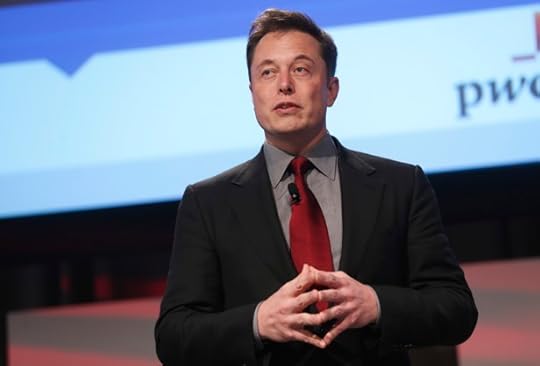
Nearly two years ago, Elon Musk unveiled a blueprint for the Hyperloop: a fantastical, futuristic train that would link San Francisco and Los Angeles by means, essentially, of a giant tube. If the system worked, he said, four or five riders could whisk along the 350-mile long track in half an hour—a mode of transport both faster and cheaper than driving or flying.
Musk didn’t exactly design the Hyperloop though: He put a PDF about it on his website and said anyone could have a go. Since then, as many engineers have poked holes in its technical reasoning as companies have sprung up, trying to turn the conjecture into reality.
Neither Musk himself nor his astrophysics company, SpaceX, have touched the Hyperloop idea since August 2013. (The startups bearing the Hyperloop name, including Hyperloop Transportation Technologies, are not affiliated with either Musk or SpaceX.)
On Monday, though, both will take up the idea again. According to documents provided to The Atlantic, Musk and SpaceX are announcing a competition for the best Hyperloop pod design, targeted at university and independent engineering teams. The competition will include both a design competition and a build competition, for which teams will run half-scale pods down a Hyperloop test track.
That one-mile-long test track will be built for the competition by SpaceX near its headquarters outside Los Angeles. No humans will travel through the tube. The company plans to offer competition winners a prize, but it hasn’t yet said what that will be. “While we are not developing a commercial Hyperloop ourselves, we are interested in helping to accelerate development of a functional Hyperloop prototype,” SpaceX said in a statement.
 An artist’s rendering of the Hyperloop (SpaceX)
An artist’s rendering of the Hyperloop (SpaceX) The company also poses some “representative questions” which it hopes teams will answer in the design contest—questions that make it clear just how much work still needs to be done hammering out the Hyperloop idea. They include: “What safety mechanisms are in place to mitigate a complete loss of pod power?” and “What safety mechanisms are in necessary to mitigate a tube breach?” and “How should ground operators communicate with the pod, especially in the case of an emergency?”
The company, hoping to catch idle students on summer break, asks participants to apply before September 15, 2015. The competition day on the test track is scheduled for June 2016.
While many fields eschew design contests, as they’re a form of working for free, such competitions tend to be more embraced in engineering, where the costs of participation are steep and many teams find corporate or academic sponsors. The first private spaceflight, after all, came about because of an XPrize-funded private engineering competition. They also—somewhat like Musk’s fantastical, tycoon-driven ethos—have something of a Victorian flair.
After all (in another Jules Verne-like touch), the entire Hyperloop project exists as a kind of challenge to the California high-speed rail line, the most expensive public-works project in American history. That project is slated for completion in 2029, which might seem like a distant date. But, on the other hand, at least engineers know how the trains they're building will work.









The Big Question: Reader Poll

We asked readers to answer our question for the July/August issue: What was the most significant airplane flight in history? Vote for your favorite response—or submit your own at the bottom of the poll. We’ll publish the results online and in the next issue of the magazine.
Create your own user feedback surveyComing up in September: What fictional city (or other locale) would you most like to inhabit? Email your nomination to bigquestion@theatlantic.com for a chance to appear in the September issue of the magazine and the next reader poll.









The Game of Thrones Season 5 Finale: A Bleakness Binge

Spencer Kornhaber, Christopher Orr, and Amy Sullivan discuss the latest episode of Game of Thrones.
Orr: [Long pause. Everyone, catch your breath. Maybe a glass of water? Depending on when you’re reading this, you might also want to tour the web for the horrified-reaction videos that will confirm you’re not alone. See? A perfectly normal response to extreme (televisual) trauma. You’re ready.]
So, yes, that happened. Rest assured, non-book-readers, that the mega-stabbing of Jon Snow was the last Big Terrible Moment that the George-R.-R.-Martinized among us knew was coming. For what it’s worth, pretty much no one believes Jon is going to stay dead. The two predominant theories are that Melisandre will raise him with that Lord-of-Light mojo (which we know is possible thanks to Thoros of Myr’s resurrection of Beric Dondarrion back in season three) or that he somehow wargs into his direwolf, Ghost. Melisandre’s conveniently timed return to Wall—in the books, she never left, staying behind when Stannis marched on Winterfell—is certainly in keeping with theory one.
That said, non-book-readers, you have to admit that maybe it wasn’t really that great a surprise. After all, the show has been hinting quite heavily in the direction of a Night’s Watch mutiny for weeks. Olly—a non-book character created for the show—has done pretty much everything but wander around Castle Black in a T-shirt that says “Did You Know the Wildlings Ate My Ma and Pa?”
Related Story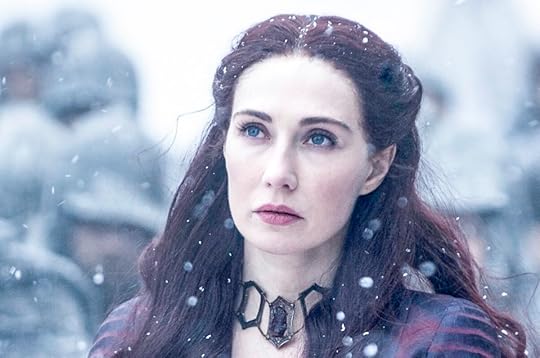
The Most Horrifying Game of Thrones Death Yet
Indeed, there’s been a notable difference between the major shocks of previous seasons (the Red Wedding, the Ned beheading, Joffrey’s not-at-all tasty helping of wine and pigeon pie) and those of this one (Sansa’s marital rape, Jon’s Ides-of-March moment, and, to a somewhat lesser degree, the auto-da-fe of Shireen). The former were genuinely unexpected events (however much sense they made in retrospect), but the latter, however shocking, haven’t been nearly so surprising because they’ve been so heavily foreshadowed. I’ve mentioned this before, but despite their strong eye for drama, Benioff and Weiss lack the subtlety of Martin: They tend to go for bigger, rather than cleverer or more nuanced. This finale offered an awful lot of the former and not much of the latter.
Before discussing the many, many terrible things that happened this episode, let me get the small number of non-terrible things out of the way. First, Sam let Jon know that he had become unexpectedly sexually active, and that having learned to enjoy breaking his Night’s Watch vows, he’d be well-positioned to break his maester ones. “I’m glad the end of the world is working out well for someone,” cracked Jon. Of course, moments later his last friend at the Wall was gone, and we now know how that turned out.
At Winterfell, Theon finally—well, I was about to write “grew a pair,” but I recognize that as tactless under the circumstances—betrayed Ramsay, and he and Sansa either (hopefully) escaped or (quite possibly) broke their legs jumping from the Winterfell ramparts. So … good news, mostly. Two quibbles: First, when Sansa purloined that corkscrew a few episodes back, I assumed it was so she could go all Patricia Arquette on James Gandolfini in True Romance, except with Ramsay as the cork getting screwed. Instead, she used it to open a door? Supremely disappointing.
Second, even though it turned out well, the scene with bow-happy Myranda represented Game of Thrones at its worst. I don’t care who she’s sleeping with, the kennel master’s daughter does not publicly threaten a noblewomen with deadly force while graphically describing the sexual mutilations in store for her. It is perhaps worth noting here that a remarkable proportion of the characters that Benioff and Weiss have invented or expanded for the show are sadists (Ramsay, Locke, Myranda, Meryn Trant) or female victims of horrific violence (Ros, Talisa). Seriously, guys. Enough.
Which brings us to Meereen, where we finally had a nice moment uncluttered by imminent stabbings or threats of torture. Things started out a little unpromisingly, with the proposal of an awfully dubious ruling triumvirate (Grey Worm, Missandei, and Tyrion) and what looked like a truly mirthless buddy road comedy (Jorah and Daario). But then Varys appeared, and suddenly the Meereenese sun offered warmth as well as heat. “I did miss you,” Tyrion confessed. “I know,” Varys demurred. A moment as full of sly joy as this one could make up for a lot of Thronesian horror. Just not as much as this episode doled out.
Begin with Stannis. Just two episodes ago, he was among the most likable characters on the show, and certainly near the top of the more plausible prospects to bring peace and justice to Westeros. Then, last week, in a radical departure from his previously expressed beliefs, he hastily burnt his daughter to death for a red priestess who has now been revealed to be a quack. Tonight, his men abandoned him, and his wife was hanged (or hanged herself? It felt as though they were implying the latter, but given the height and the knot it seemed like an improbable suicide), and he and his shattered army were subsequently slaughtered by Boltons. This arc might have worked—might even have been heartbreaking—if it had been stretched out over, say, four episodes or more. But like several plotlines this season (e.g., the rise of the Faith Militant), it was squeezed to the point where it lost both moral weight and narrative coherence. I’ll miss you tremendously, Stannis; and at the same time, good riddance.
Brienne’s subplot was not a tragedy comparable to the utter collapse of House Baratheon—which is now represented by only two heirs one heir utterly devoid of Baratheon blood—but it nonetheless had a dark underside. Yes, Brienne finally got vengeance for Renly by killing his big brother. But let’s face it, that big brother was already three-quarters dead. And more importantly, she once again failed her vow to Lady Catelyn to protect the Stark daughters. Sansa lit her candle and … no Brienne. Littlefinger’s tavern critique of her usefulness as a bodyguard is ringing truer by the season.
Things were hardly any better in Braavos, where the time spent these past two weeks making Meryn Trant an abuser of little girls—a charming tidbit that is not, again, in the books—could have been put to better use doing literally anything at all. There was a time when “All men must die” seemed like the perfect tagline for Game of Thrones. But that title has been clearly usurped of late—and not for the better—by Cersei’s last-season comment to Oberyn, “Everywhere in the world they hurt little girls.”
About the only thing worse than making Arya pretend to be underage in order to get close to Trant—as opposed to, say, selling him a poisoned oyster at the docks, or slipping Needle into his back in some alley—was turning her into a Ramsayesque avenging angel, slicing out Trant’s eyes and monologuing like a Bond villain. Again, maybe this is an evolution that could have been pulled off over time. But this new psycho version of Arya felt utterly unearned. (Also: foolish and implausible, given that she was dealing with a knight who outweighed her by 100 lbs.) And then she went blind. Good times.
Regular readers of the roundtable will know that I’ve long been convinced that nothing of importance was ever going to happen in Dorne. I fear I’ve been proven correct in the most dramatic fashion possible. The whole Jaime-Bronn trip was occasioned by the idea that Ellaria Sand wanted to kill Myrcella to avenge Oberyn and foment war between Dorne and the Lannisters. And now, after an embarrassingly easy infiltration of the Water Gardens, a cellblock striptease, and the utterly absurd pardoning of a clearly unrepentant Ellaria (Prince Doran is obviously not the one tasked with getting red-wine stains out of his rugs), that’s exactly what happened.
My first words when Ellaria went in for that kiss with Myrcella—I have witnesses!—were “poisoned lipstick?” And the minute Jaime started telling his daughter that she was his daughter, and she said that she knew and was happy about it, I initiated the audible Little Girl Death Countdown. Cue the inevitable nosebleed and subsequent demise. For a moment it appeared that Ellaria might die too, giving her life for her vengeance. But no, not even that. She and the Sand Snakes are the worst. I feel obligated to note here that after a lot of preseason buzz about what strong, formidable female characters the Sand Snakes would be, the most prominent among them, Tyene, has so far a) exposed her body in jail to arouse a man; b) played slap games with her sister; and c) uttered the line “You want the good girl, but you need the bad pussy.”
I don’t have much to say about Dany, except that she obviously needs to find a way to inject subcutaneous caffeine into Drogon. Although I suppose he could be forgiven for his doziness given that he had, to all appearances, flown her to Scotland. When that Khalasar of Dothraki riders came down from the hills, I was moderately taken aback by the fact that they weren’t wearing kilts and painting their faces blue. What does this all portend? I have no idea. But it doesn’t look promising.
Which brings us to Cersei’s Walk of Atonement—a big scene in the books and one that Benioff and Weiss were perhaps predestined to overplay. As former Atlantic roundtabler Ross Douthat noted a few weeks ago, “the image is simply different from the word”—that is, video is a more immediate, visceral medium than print—and this scene seemed like a perfect test case. While it may have seemed bold, the near-constant, full-frontal nudity (and not only Cersei’s) distracted from her shame and horror rather than deepening it. This was an instance in which implication would have been more powerful than direct depiction.
Skipping over the political machinations in King’s Landing is by definition a bad idea.It didn’t help that, unless I’m mistaken, most if not all of the nude shots involved superimposing Lena Headey’s face on the frame of a body double, which is not the way any actor could possibly be expected to do their best work. The result was not a bad scene, but rather one should have been better. (Also, what the hell else is going on in King’s Landing? Where’s Maergery? Lady Olenna? Is Littlefinger still in town? What about Tommen? Kevan? Pycelle? And given that those last two seem ascendant—and unfriendly to Cersei—why have they let her creepy pet Qyburn keep his post? Skipping over the political machinations in King’s Landing is by definition a bad idea.)
Which brings me back to my principal critique of the episode: There was simply too much going on—and, in particular, too many horrible things taking place—for any of the events to carry the emotional weight they deserved. Stannis was destroyed; Arya went berserk (and then blind); Jaime gained a daughter and then immediately lost her; Dany went from being queen to (presumed) captive; Cersei was humiliated in the most appalling fashion imaginable—and then, then, we were still expected to take in, and be brutalized by, the death(?) of Jon Snow.
Now, the fact that Jon’s stabbing didn’t affect me as much as I’d have liked it to have is doubtless in part because, like all book readers, I knew it was coming. But I think that sheer emotional exhaustion played at least as great a role. This episode seemed to be based (like Game of Thrones in general, perhaps) on the thesis that the human capacity for horror is always cumulative, rather than something that can be exhausted.
I particularly felt this in the effort to extend that final scene for a few moments of maximal, but utterly predictable and unnecessary, drama. Jon was stabbed once, twice, three times, four. (Did I miss one in there? Maybe.) Then a pause, before Olly emerged from the crowd. He moved in close, and Jon optimistically uttered his name. Another pause, and then—shocker!—Olly delivered the killing blow. (Figuratively, at least. Jon was obviously already fatally wounded.)
Again, is there anyone who could have been genuinely surprised at Olly’s betrayal? His entire purpose all season has been to telegraph that this exact outcome was in store. Trying to increase the drama of Jon Snow being (apparently) stabbed to death seemed absurd on its face, but doubly absurd when the dramatic kick was so obviously foreordained.
But I’ve gone on way, way too long. What did you guys think? Did tonight’s finale exhaust your emotional capacities too? Or did it simply blow your minds?
Sullivan: Oh, there it is—the feeling of hopelessness and despair that sunk in after I finished A Dance With Dragons nearly four years ago. Usually, turning the last page of a book in a long series brings with it a surge of excitement. You can’t wait to find out what happens next. But if every ray of light and decency in this series gets snuffed out, why bother continuing? Yes, at this point we’ve sunk five years and thousands of pages into the story. But maybe, just maybe, it’s time to cut our losses.
It’s incredibly hard to craft a epic series without getting necessarily bogged down in the middle installments. Your protagonists are usually in some long-term predicament or up against an enemy who will keep winning until some resolution is reached in the finale. That’s a lesson I learned early on, when even my beloved Chronicles of Prydain books dragged a bit after the thrilling first few.
So the need to throw in a few shocking moments for the sake of surprise and to keep readers/audiences off-balance is understandable. But there still needs to be something to keep us—and our heroes—going further. Right now, I feel like Tyrion. I’ve lost everyone I ever cared about, traveled thousands of miles, finally met a leader who might deserve my interest, and for what? So I can sort out the internal politics of a desert city to which I have absolutely no connection?
Let’s review our journey. We began the series with the Starks, a handsome family of nobles who are swiftly separated and placed in varying degrees of danger. Ah, so that’s our motivating interest—we want to see them get back together! Except [thwack] Ned loses his head, and [whump whump] Robb and Catelyn get knifed, and suddenly we’re left with a handful, if that, of Starks scattered around the seven kingdoms and beyond.
Okay, fine. Then we’ll be invested in finding out who wins the game of thrones and ends up on the Iron Throne for a long reign. All signs are pointing to Dany, who has been trying to raise an army and sail to Westeros for five seasons now. She finally has a worthy advisor and nearly full-grown dragons, so her homecoming must be near. What’s that? She’s wandering in the wilderness, captive of the Dothraki? Again?
Fine. Then we’ll stick around to find out how Jon defeats the White Walkers, the true threat to the continent. We’re still shivering from that Hardhome episode, and entranced by the clues that have been dropped about Jon’s real origins, which indicate that he’s the prophesied one who can … What the what?!
Sigh.
Tyrion may be everyone’s favorite character, and Arya everyone’s favorite badass—at least before she turned into a murderous psycho in this finale—but Jon is the soul of Game of Thrones. Whether or not he is genetically Ned Stark’s son, he is the heir to Ned’s noble, sometimes flawed worldview, one that gives us moral balance and reminds us of the real stakes in this epic. I suppose it’s ironic that Jon is killed because he was more focused on the threat from the White Walkers than from his own men. But it’s also stupid. The White Walkers just wiped out thousands of Wildlings. Someone in Westeros needs to think that’s alarming.
Jon is the soul of Game of Thrones. He gives us moral balance and reminds us of the real stakes in this epic.Instead, the two people who actually worried about the threat from the North are dead. And Ramsay lives to see another season. Who wasn’t rooting for that fan favorite to return? Yippee.
Like you, Chris, I was excited by the ways Benioff and Weiss departed from the books last year and hoped that their creative intervention would be the key to tightening and propelling the narrative. Brienne’s face-off with the Hound in last season’s finale was both an exciting set piece but also an important character moment for Arya and her would-be protectors. Likewise, the expansion of Tywin Lannister’s character lent heft to Kings Landing plots and power to his murder at the hands of Tyrion.
This season’s digressions, in contrast, seem designed simply as ways to keep fan favorites involved—no doubt part of the appeal in those Brienne and Tywin storylines as well—without amounting to much of anything:
Jaime travels to Dorne because Cersei fears their daughter’s life is in danger. And now Myrcella is dead anyway. Littlefinger negotiates the worst arranged marriage for Sansa, and she endures rape and other abuse from Ramsay. And assuming she and Theon didn’t just break their necks, we’re either in for a season of them on the run from Ramsay, or she’s free of him and that storyline was pointless. And speaking of Littlefinger, this season took one of the show’s great schemers and had him make two massive blunders—somehow missing Ramsay’s well-known reputation as a terrifying sociopath, and misjudging the relative military skills of Roose Bolton and Stannis Baratheon. Stannis sacrifices his daughter, the only person who loves him, because it’s the only way he can take Winterfell. And now he’s dead anyway, and the sigil of the flayed man still flies over Winterfell. A major Westerosi figure finally makes it to Meereen and forms an alliance of sorts with Dany! And now she’s flown off, ended up back with the Dothraki, and Tyrion is stuck running the dysfunctional city she left behind. Civil government hijinks will no doubt ensue.The one major exception this season was the Hardhome battle, which departed from and improved upon the books by providing an unforgettable demonstration of the horrors that could befall Westeros when winter arrives. Two episodes later, it seems but a blip in the show’s memory. Jon’s stirring speech in Hardhome convinced many of the Wildling leaders to put aside their longstanding hatred of the Nights Watch in order to fight a more terrifying common enemy. Surely a similar speech—with testimony from his traumatized comrades who saw the White Walkers themselves—could have made some impression on the Watch.
Instead, now we have to spend a year hoping that Melisandre can put Jon back together again. Considering that either her magical powers are seriously on the fritz or she just burned a little girl to death for no reason at all, that’s of little comfort. Winter is coming. Uncle Benjen is still out there. And Jon Snow cannot be dead. Do you hear me, George Martin? He cannot!
Kornhaber: Well. I liked the episode. By which I mean, I share your despair, I share your exhaustion, and I share many of your frustrations. But the hour still had a bit of that old Thrones feeling—making the unthinkable thinkable, and making you feel childish for ever thinking it couldn’t be thought. (Got that?)
Call me naive, or just call me a show watcher and not a book reader. Yes, an attempt on Jon’s life had been foreshadowed for weeks. But I suspected it would just be an abortive shivving from Olly, not a successful and gruesome ambushing from the adults of the Night’s Watch. The jam-packed nature of the episode only heightened my surprise. After one major death—of Stannis—and a bunch of second-tier but individually shocking demises (Selyse, Meryn Trant, Myrcella, Myranda, kinda-sorta Jaqen H'ghar, Arya’s eyesight), plus one of the most vivid set pieces Thrones has served up (Cersei’s walk), I thought—like Stannis before learning of his wife’s fate—it can’t get worse.
In fact, the show had tricked me as surely as Olly tricked Jon, but about the idea that the new Lord Commander is one of three people guaranteed to survive till the final hours of the series (Tyrion and Daenerys are the other two presumed immortals, an idea that sounds ridiculous as soon as I say it). I mean, if you’re going to set the Internet abuzz speculating about the guy’s parentage, he’s got to stick around for the mystery to be solved, right? Right? No? Okay, no.
Change requires breaking rules that have developed over millennia, and tonight’s episode reminded of the consequences of doing so.More importantly, Jon lately had seemed not only heroic but also savvy, a world-weary improvement on the honor-for-honor’s sake stylings of Robb and Ned Stark. But when you step back, was he really so different? Even as he beheaded a sniveling subordinate, bonded with uber-practical Stannis, and led the exodus from Hardhome, Jon was still more focused on big-picture righteousness than on the small-scale politics that ruled the people around him. Maybe the game he set out to play was unwinnable. Imagine you’re a run-of-the-mill Crow, resigned to living a harsh, Spartan, and straightforward existence—and then some nobleman’s son with nice hair starts playing fast and loose with his oath because he thinks he can save the world. I might have felt a little stabby too.
It’s not a fair death, but it’s not a pointless one either. Westeros and Essos are backwards, unjust, and brutal places, and Jon was one of the few people trying to change that—and he did to some extent succeed by getting the Wildlings south of the wall. But change requires bending or breaking rules that have developed over millennia to keep the grim status quo in place, and tonight’s episode reminded of the often-ugly consequences to doing so. Arya went rogue and lost her sight. Cersei’s adultery was punished in humiliating fashion. Jaime, I suppose, broke with the logic of blood feuds and ended up having his father-daughter bonding time cut remarkably short.
And Stannis faced justice for torching his own humanity. I actually liked the brevity with which his downfall was portrayed in this episode. Shireen’s sacrifice may or may not have changed the weather; it definitely changed the army’s opinion of their leader, a fact that Melisandre and Stannis should have foreseen. But magic is, well, magic—you can understand the assumption that the Red God would take care of everything once the pyre was lit. The mistake is so fundamental that both Stannis and Melisandre seem to realize it as soon as they’re told of the soldiers’ overnight desertion. The weirdly beautiful shot of the well-organized Bolton cavalry closing in on Stannis’s ragged band of foot soldiers said it all; I didn’t need the point belabored with (even more) graphic depictions of the Baratheon defeat. At least Stephen Dillane got one last good growl in before being Brienned.
Who’s left to care about, you ask? The King’s Landing plotline turned from tedious to intriguing for the first time in at least half a season once Cersei stumbled into the Red Keep and revenge entered her eyes where terror should have been at the sight of the reanimated Mountain. The preceding march of shame was compelling, though I agree that the camera seemed interested in Lena Headey’s body double to the point of prurience. What really mattered was Headey’s face. It’s clear she felt no actual shame for what she’s done; instead, there was humiliation and contempt, kept mostly in check by the sight of palace in the distance and all it represents. Cersei will never be someone to root for, but her status as a perpetually fierce survivor and the question of what she will do next is enough to make me tune in next season.
As for the rest of the cast: Arya as Daredevil could be cool. It’ll be satisfying to see Alliser Thorne turned into an icicle by a White Walker, or stabbed by fire-resurrected Jon Snow, or stabbed with an icicle by White Walker Jon Snow. By contrast, the prospect of Dany needing to escape from the Dothraki makes me feel as drowsy as Drogon. And I’ve long ached for Jaime to get to display an emotion other than ache, which isn’t going to happen now.
You’re both right to be wary of where things are headed. It sounds like Benioff and Weiss will be mostly unchained from the books next season, which is scary because they made nearly fatal storytelling choices in Dorne, Winterfell, and King’s Landing this season. But the show’s core appeal remains. There’s just nothing like it: cinematically ravishing, continually asking hard questions about justice and goodness and practicality, and totally willing to burn itself down and rebuild as the story requires. Jon might rise up from the snow or he might not; I like that in essence, we know nothing.









The 2016 U.S. Presidential Race: A Cheat Sheet

You might have imagined Jeb Bush was already a candidate for president. After all, he’s been traveling around the country and the world, delivering policy speeches, and working toward a $100 million fundraising goal.
Legally, though, Bush hasn’t declared his candidacy. That changes Monday afternoon, when he officially kicks off his campaign in Miami. (As a non-candidate acting like one, he offers an interesting mirror image to Hillary Clinton, who was a candidate acting like she wasn’t one ahead of her Saturday speech in New York.)
Bush’s non-candidacy has traced an unsteady path. Early on, he seemed unlikely to run. And then, with practically no fanfare or whispers, he announced in December 2014 that he was “actively exploring” a campaign. Almost immediately, he became the frontrunner in a crowded field. Since then, however, his strength seems to have faltered. While he still maintains a small overall edge in polling, other candidates have taken a bite out of his numbers. In early states, he looks soft. He has been painted—unfairly, his defenders say—as a moderate, and he’s proved that while he commands facts and figures in a way his brother didn’t, he also lacks his brother’s natural political charisma. (Oh right, his brother—that’s another issue.) Bush recently reshuffled his campaign staff, a sign of concern even before the campaign had legally begun.
Even without a cakewalk to the nomination, Bush is still arguably the strongest candidate in the Republican field—the one with the greatest reserves and the strongest polling numbers. Holding on to that pole position will require him to be a stronger official candidate than he was an unofficial one, though.
With so many candidates in the mix—some announced, some soon to announce, and some still on the fence—it’s tough to keep track of it all. To help out with that, this cheat sheet on the state of the presidential field will be periodically updated throughout the campaign season. Here's how things look right now.
* * *
The Republicans Gage Skidmore
Gage Skidmore Jeb Bush
Who is he? The brother and son of presidents, he served two terms as governor of Florida, from 1999 to 2007.
Is he running? Yes, as of June 15.
Who wants him to run? Establishment Republicans; George W. Bush; major Wall Street donors.
Can he win the nomination? No one really knows. Since jumping into the race, he has continued to poll well and raise lots of money. He seems like a lock to rack up all-important endorsements from top Republicans. But predictions that he would quickly come to dominate the field have not come to pass, and while many analysts predicted that his moderate record would cause trouble in Iowa and with grassroots activists, that problem seems to be deeper than expected. His poll numbers are probably helped by his name, which is a double-edged sword.
What else do we know? Since Bush's surprise announcement, he has tended to stay fairly quiet, delivering some big speeches and hitting fundraisers, but not making a great number of trips to Iowa or New Hampshire.
Does his website have a good 404 page? No.
 Gage Skidmore
Gage Skidmore Rick Perry
Who is he? George W. Bush’s successor as governor of Texas, he entered the 2012 race with high expectations, but sputtered out quickly. He left office in 2014 as the Lone Star State’s longest-serving governor.
Is he running? Yes. He announced on June 4.
Who wants him to run? Small-government conservatives; Texans; immigration hardliners; foreign-policy hawks. Noah Rothman makes a case here. (Perry's top backer four years ago, non-relative Bob Perry, died in 2013.)
Can he win the nomination? Maybe, but who knows? Perry and his backers insist 2016 Perry will be the straight shooter who oversaw the so-called Texas miracle, not the meandering, spacey Perry of 2012. We'll see. Perry has also made a point of quietly spending lots of time in Iowa, a strategy he didn’t use in 2012—but which Rick Santorum used very successfully.
Does his website have a good 404 page? That depends. Is this an “oops” joke? If so, yes.
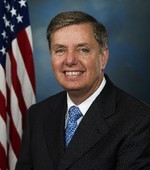 Wikimedia
Wikimedia Lindsey Graham
Who is he? A senator from South Carolina, he’s John McCain’s closest ally in the small caucus of Republicans who are moderate on many issues but very hawkish on foreign policy.
Is he running? He sure is. Graham kicked off the campaign June 1.
Who wants him to run? John McCain, naturally. Senator Kelly Ayotte, possibly. Joe Lieberman, maybe?
Can he win the nomination? Not really. The South Carolina senator seems to be running in large part to make sure there’s a credible, hawkish voice in the primary. It seems like Graham started his campaign almost as a lark but has started to enjoy the ride, plus he’s shown he’s a great performer on the stump. Molly Ball explores his chances at greater length here.
What else do we know? Graham promises to have a rotating first lady if he wins. We nominate Lana del Ray.
 Michael Vadon
Michael Vadon George Pataki
Who is he? Pataki ousted incumbent Mario Cuomo in 1994 and served three terms as governor of New York.
Is he running? Yes. He announced May 28.
Who wants him to run? It's not clear. Establishment Northeastern Republicans once held significant sway over the party, but those days have long since passed.
Can he win the nomination? No. As my colleague Russell Berman previously noted, Pataki is one of the longest of the long-shot GOP candidates. He has touted his leadership on 9/11, when he served as governor, but so did former New York City Mayor Rudy Giuliani. He was also a successful conservative governor in a deep-blue Northeastern state, but so was former Massachusetts Governor Mitt Romney. He seems be socially liberal enough to alienate primary voters, but not enough to capture Democrats.
Does his website have a good 404 page? No.
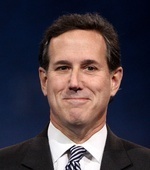 Gage Skidmore
Gage Skidmore Rick Santorum
Who is he? Santorum represented Pennsylvania in the Senate from 1995 until his defeat in 2006. He was the runner-up for the GOP nomination in 2012.
Is he running? Yes, with a formal announcement on May 27.
Who wants him to run? Social conservatives. The former Pennsylvania senator didn't have an obvious constituency in 2012, yet he still went a long way, and Foster Friess, who bankrolled much of Santorum's campaign then, is ready for another round.
Can he win the nomination? It's tough to imagine. Santorum himself said his chances would hinge on avoiding saying "crazy stuff that doesn't have anything to do with anything." For now, his poll numbers remain in the basement.
Does his website have a good 404 page? No.
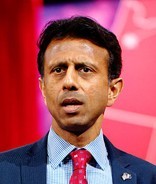 Gage Skidmore
Gage Skidmore Bobby Jindal
Who is he? A former Rhodes Scholar, he’s the outgoing governor of Louisiana. He previously served in the U.S. House.
Is he running? Probably. He announced on May 18 that he is forming an exploratory committee, with a final decision to come after Louisiana’s legislative session ends on June 11.
Who wants him to run? It’s hard to say. Jindal has assiduously courted conservative Christians, both with a powerful conversion story (he was raised Hindu but converted to Catholicism in high school) and policies (after other governors reversed course, he charged forward with a religious-freedom law). But he still trails other social conservatives like Ted Cruz and Mike Huckabee.
Can he win the nomination? Probably not. Jindal still lacks traction at the national level, he faces an overcrowded field of social conservatives, and his stewardship of the state of Louisiana has come in for harsh criticism even from staunch fiscal conservatives. It’s hard to see how he gains momentum from here.
When will he announce? June 24.
What else do we know? In 1994, he wrote an article called “Physical Dimensions of Spiritual Warfare,” in which he described a friend’s apparent exorcism.
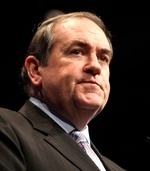 Gage Skidmore
Gage Skidmore Mike Huckabee
Who is he? An ordained preacher, former governor of Arkansas, and Fox News host, he ran a strong campaign in 2008, finishing third, but sat out 2012.
Is he running? Yes. He kicked off the campaign May 5.
Who wants him to run? Social conservatives; evangelical Christians.
Can he win the nomination? Huckabee's struggle will be to prove that he's still relevant. Since he last ran in 2008, a new breed of social conservatives has come in, and he'll have to compete with candidates like Ted Cruz. His brand of moral crusading feels a bit out of date in an era of widespread gay marriage—not least when curiously chose to attack Beyoncé. (His statements in support of Josh Duggar have also earned him criticism and quizzical reaction.) He faces fire from strict anti-tax conservative groups for tax hikes while he was governor. And fundraising has always been his weak suit. But Huckabee's combination of affable demeanor and strong conservatism resonates with voters.
Does his website have a good 404 page? It’s pretty good.
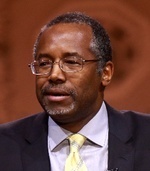 Gage Skidmore
Gage Skidmore Ben Carson
Who is he? A celebrated former head of pediatric neurosurgery at Johns Hopkins, Carson became a conservative folk hero after a broadside against Obamacare at the 2013 National Prayer Breakfast.
Is he running? Yes, after a May 4 announcement.
Who wants him to run? Grassroots conservatives, who have boosted him up near the top of polls, even as Republican insiders cringe. Carson has an incredibly appealing personal story—a voyage from poverty to pathbreaking neurosurgery—and none of the taint of politics.
Can he win the nomination? Almost certainly not. Carson's politics are conservative on some issues, but so eclectic as to be nearly incoherent overall. He's never run a political campaign, and has a tendency to do things like compare ISIS to the Founding Fathers. Despite initially building a formidable organization, he’s struggled to keep it together, with a rash of top staffers defecting.
Does his website have a good 404 page? No.
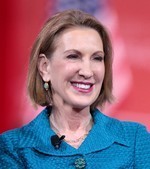 Gage Skidmore
Gage Skidmore Carly Fiorina
Who is she? Fiorina rose through the ranks to become CEO of Hewlett-Packard from 1999 to 2005, before being ousted in an acrimonious struggle. She advised John McCain’s 2008 presidential campaign and unsuccessfully challenged Senator Barbara Boxer of California in 2010.
Is she running? Yes, as of a May 4 announcement.
Who wants her to run? It isn’t clear what Fiorina’s constituency is. She’s a former CEO of Hewlett-Packard, but there are other business-friendly candidates in the race, all of whom have more electoral experience.
Can she win the nomination? Almost certainly not. Fiorina’s only previously political experience was a failed Senate campaign against Barbara Boxer in 2010. She has mostly been serving the role of harasser in the race so far, stirring up the news with slams on environmentalists for causing droughts (your guess is as good as mine), Obama for backing net neutrality, and Apple’s Tim Cook for speaking out on Indiana’s Religious Freedom Restoration Act. Mainly, though, she has strongly criticized Hillary Clinton, and some Republican strategists like the optics of having a woman to criticize Clinton so as to sidestep charges of sexism. Fiorina seems to be wowing voters in Iowa, but that hasn’t translated into national support—yet.
What else do we know? Fiorina's 2010 Senate race produced two of the most entertaining and wacky political ads ever, "Demon Sheep" and the nearly eight-minute epic commonly known as "The Boxer Blimp."
Does her website have a good 404 page? No.
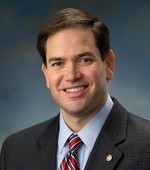 Wikimedia
Wikimedia Marco Rubio
Who is he? A second-generation Cuban-American and former speaker of the Florida House, Rubio was catapulted to national fame in the 2010 Senate election, after he unexpected upset Governor Charlie Crist to win the GOP nomination.
Is he running? Yes—he announced on April 13.
Who wants him to run? Rubio enjoys establishment support, and has sought to position himself as the candidate of an interventionist foreign policy.
Could he win the nomination? Charles Krauthammer pegs him as the Republican frontrunner. His best hope seems to be to emerge as a consensus candidate who can appeal to social conservatives and hawks, and he's even sounded some libertarian notes of late. He's well-liked by Republicans, and has surged forward since announcing, but he needs to move up from second choice to first choice for more of them. Rubio seems to scare Democrats more than any other candidate, too.
Does his website have a good 404 page? It’s decent.
 Wikimedia
Wikimedia Rand Paul
Who is he? An ophthalmologist and son of libertarian icon Ron Paul, he rode the 2010 Republican wave to the Senate, representing Kentucky.
Is he running? Yes, as of April 7.
Who wants him to run? Ron Paul fans; Tea Partiers; libertarians; civil libertarians; non-interventionist Republicans.
Can he win the nomination? That depends who you ask. The Kentucky senator would be an unorthodox pick, with many positions outside his party's mainstream. He's relatively permissive on drugs, passionate about civil liberties, and adamantly for restraint on foreign policy. But Paul has worked hard to firm up establishment ties since reaching the Senate, and he has recently worked to paper over his differences with GOP’s hawkish wing, calling for a declaration of war against ISIS and generally saber-rattling. He is positioning himself as a candidate with crossover appeal in the general election, and his announcement email mocked the idea that only an establishment candidate can win a general election.
What else do we know? One of Paul's greatest strengths is the base bequeathed to him by his father, three-time presidential candidate and former Representative Ron Paul. But as The Washington Post has reported, his father is also Senator Paul's biggest headache.
Does his website have a good 404 page? No.
 Wikimedia
Wikimedia Ted Cruz
Who is he? Cruz served as deputy assistant attorney general in the George W. Bush administration and was appointed Texas solicitor general in 2003. In 2012, he ran an insurgent campaign to beat a heavily favored establishment Republican for Senate.
Is he running? Yes. He launched his campaign March 23 at Liberty University in Virginia.
Who wants him to run? Hardcore conservatives; Tea Partiers who worry that Rand Paul is too dovish on foreign policy; social conservatives.
Can he win the nomination? Though his announcement gave Cruz both a monetary and visibility boost, he still starts with some serious weaknesses. Much of Cruz's appeal to his supporters—his outspoken stances and his willingness to thumb his nose at his own party—also imperil him in a primary or general election, and he's sometimes been is own worst enemy when it comes to strategy. But Cruz is familiar with running and winning as an underdog.
Does his website have a good 404 page? No.
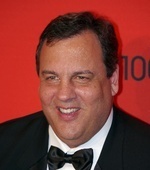 David Shankbone
David Shankbone Chris Christie
Who is he? What’s it to you, buddy? The combative New Jerseyan is in his second term as governor and previously served as a U.S. attorney.
Is he running? It seems ever harder to imagine. With indictments of two of his former top aides in early May, and a guilty plea by a high-school friend and political appointee, the George Washington Bridge scandal has crept ever closer to him. The New York Times says he's trying to "salvage" his campaign. Christie does have some campaign infrastructure in place in New Hampshire, which is close to his home state, with staffer hires and town-hall meetings there. He has also formed a political-action committee.
Who wants him to run? Moderate and establishment Republicans who don't like Bush or Romney; big businessmen, led by Home Depot founder Ken Langone.
Can he win the nomination? The tide of punditry had turned against Christie even before the "Bridgegate" indictments. It's hard to imagine how he recovers at this point, given the crowded field and the fact that Jeb Bush seems to dominate the moderate end of the Republican Party. Citing his horrific favorability nominations, FiveThirtyEight bluntly puns that "Christie's access lanes to the GOP nomination are closed." A recent Monmouth University poll showed him trailing even Donald Trump (see below) for the nomination. Plus, he'd probably have to resign as governor to run, because of SEC rules that cover donations from companies that do business with the state. With such high stakes, he might not want to run at all if he doesn't see a clear path to win.
When will he announce? According to Time, Christie has told donors that running is harder than he had realized, and that he may have to push back an announcement to as late as June.
What else do we know? If you can tell what is going on in this GIF, please let me know. Is he tossing the jacket away? Or catching it? And what does it mean?
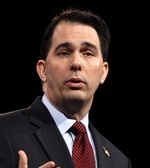 Gage Skidmore
Gage Skidmore Scott Walker
Who is he? Elected governor of Wisconsin in 2010, Walker earned conservative love and liberal hate for his anti-union policies. In 2013, he defeated a recall effort, and he won reelection the following year.
Is he running? Almost certainly.
Who wants him to run? Walker's record as governor of Wisconsin excites many Republicans. He's got a solid résumé as a small-government conservative. His social-conservative credentials are also strong, but without the culture-warrior baggage that sometimes brings. And Walker has won three difficult elections in a blue-ish state.
Can he win the nomination? No one knows. For all his strengths, Walker has never run a national campaign and isn't exactly Mr. Personality. But Jeb Bush's emergence seems to have helped Walker, propelling him to the front of the pack as a more conservative alternative to Bush. He's now solidly in the top tier of candidates.
When will he announce? July 13, perhaps. He’s waiting until after the June 30 deadline for the Wisconsin state budget.
What else do we know? Barack Obama took a shot on April 7 at Walker for his criticism of a nuclear-deal framework with Iran. That's a sign that he's becoming a power player, and sniping from the White House is only likely to elevate Walker's standing with Republicans. Good news, bad news: Walker has a geographic advantage in his proximity to Iowa, but a potential biological disadvantage from his allergy to dogs.
 Gage Skidmore
Gage Skidmore Sarah Palin
Who is she? If you have to ask now, you must not have been around in 2008. That’s when John McCain selected the then-unknown Alaska governor as his running mate. After the ticket lost, she resigned her term early and became a television personality.
Is she running? A bizarre speech in January made a compelling case both ways.
Who wants her to run? Palin still has diehard grassroots fans, but there are fewer than ever.
Can she win the nomination? No.
When will she announce? It doesn't matter.
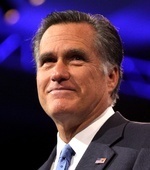 Gage Skidmore
Gage Skidmore Mitt Romney
Who is he? The Republican nominee in 2012 was also governor of Massachusetts and a successful businessman.
Is he running? Nah. He announced in late January that he would step aside.
Who wanted him to run? Former staffers; prominent Mormons; Hillary Clinton's team. Romney polled well, but it's hard to tell what his base would have been. Republican voters weren't exactly ecstatic about him in 2012, and that was before he ran a listless, unsuccessful campaign. Party leaders and past donors were skeptical at best of a third try.
Could he have won the nomination? He proved the answer was yes, but it didn't seem likely to happen again.
 Gage Skidmore John Bolton
Gage Skidmore John Bolton Who is he? A strident critic of the UN and leading hawk, he was George W. Bush’s ambassador to the UN for 17 months.
Is he running? Nope. After announcing his announcement, in the style of the big-time candidates, he posted on Facebook that he wasn’t running.
Who wanted him to run? Even among super-hawks, he didn’t seem to be a popular pick, likely because he had no political experience.
Could he have won the nomination? They say anything is possible in politics, but this would test the rule. A likelier outcome could be a plum foreign-policy role in a hawkish GOP presidency.
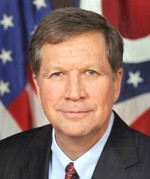 Wikimedia
Wikimedia John Kasich
Who is he? The current Ohio governor ran once before, in 2000, after a stint as Republican budget guru in the House. Between then and his election in 2010, he worked at Lehman Brothers. Molly Ball wrote the definitive profile in April.
Is he running? Almost certainly. He has visited early states, laid out ideas, and established a PAC.
Who wants him to run? Kasich’s pitch: He’s got better fiscal-conservative bona fides than any other candidate in the race, he’s proven he can win blue-collar voters, and he’s won twice in a crucial swing state. While his polling isn’t stellar, he still leads Graham, Fiorina, and Jindal.
Can he win the nomination? As Ball noted, Kasich seems in some ways perfectly suited to this race; in other ways, his insistent anti-charisma makes it hard to imagine him winning, and his attitude is amusingly blasé: “If they like it, great. If they don’t like it, I’ll play more golf.” He could be hurt by his embrace of Medicaid expansion under Obamacare, a move he had to circumvent the Republican-led General Assembly to make.
When will he announce? After June 30.
What else do we know? He doesn’t own a smartphone, and seldom uses a computer. Maybe he can be friends with Lindsey Graham—the old way, via U.S. Mail.
 Gage Skidmorety
Gage Skidmorety Donald Trump
Who is he? The real-estate developer and reality-TV star almost certainly isn’t worth as much as he wants you to think he is.
Is he running? Like, for real? Of course not.
Who wants him to run? Jon Stewart; Donald Trump.
Can he win the nomination?
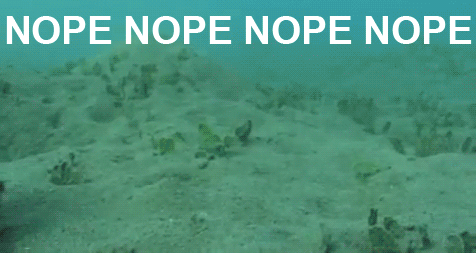
When will he announce? June 16
What else do we know? I’m deeply ashamed and upset that I had to fill out this entry.
Others Still in the Mix:
Bob Ehrlich, Peter King, Harold Stassen, Jim Gilmore
* * *
The Democrats Wikimedia
Wikimedia Hillary Clinton
Who is she? As if we have to tell you, but: She’s a trained attorney; former secretary of State in the Obama administration; former senator from New York; and former first lady.
Is she running? Yes.
Who wants her to run? Most of the Democratic Party.
Can she win the nomination? Duh.
What else do we know? Maybe a better question, after so many years with Clinton on the national scene, is what we don't know. Here are 10 central questions to ask about the Hillary Clinton campaign.
Does her website have a good 404 page? If you’re tolerant of bad puns and ’90s outfits, the answer is yes.
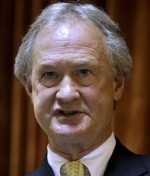 Steven Senne / AP
Steven Senne / AP Lincoln Chafee
Who is he? The son of beloved Rhode Island politician John Chafee, Linc took his late father’s seat in the U.S. Senate, serving as a Republican. He was governor, first as an independent and then as a Democrat.
Is he running? Yes—he announced his run at George Mason University on June 3.
Who wants him to run? Beyond metric-system boosters? No one knows! Even in Rhode Island, Chafee doesn’t have much support—he opted not to seek reelection as governor in 2014, in part because his approval rating had reached a dismal 26 percent.
Can he win the nomination? No. Chafee seems to be positioning himself as an economic populist and says Clinton's 2002 vote for the Iraq war should disqualify her (he was the only Republican senator to vote against it). In other words: He's Jim Webb with a less impressive resume, a less compelling bio (he's the son of longtime Senator John Chafee), and less of a political base. He gives himself even odds, though.
Does his website have a good 404 page? No.
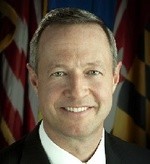 Wikimedia
Wikimedia Martin O'Malley
Who is he? He’s a former governor of Maryland and mayor of Baltimore.
Is he running? Yes. He announced his campaign on May 30.
Who wants him to run? Not clear. He has some of the leftism of Bernie Sanders or Elizabeth Warren, but without the same grassroots excitement.
Can he win the nomination? At the moment, O’Malley seems caught between Sanders, who has grasped the progressive mantle, and Clinton, who dominates the Democratic race overall. As with Sanders, though, it’s hard to see where O'Malley would get an opening unless Clinton’s campaign fell apart. The conventional wisdom since protests over the death of Freddie Gray is that protests in Baltimore undermine the case for his candidacy and make it harder for him to run, but he’s embraced the protests as a motivation for his run.
What else do we know? Have you heard that he plays in a Celtic rock band? You have? Oh.
Does his website have a good 404 page? No.
 Wikimedia
Wikimedia Bernie Sanders
Who is he? A self-professed socialist, Sanders represented Vermont in the U.S. House from 1991 to 2007, when he won a seat in the Senate.
Is he running? Yes. He announced April 30.
Who wants him to run? Far-left Democrats; socialists; Brooklyn-accent aficionados.
Can he win the nomination? It remains extremely difficult to see him winning the nomination, on the basis that primary voters tend to gravitate to “electable” general-election candidates alone. But he’s proven an ability to poll well into double digits, and he has a fired-up grassroots base. If nothing else, his campaign seems to be succeeding in getting his progressive ideas into the mix.
Does his website have a good 404 page? Yes, and it is quintessentially Sanders.
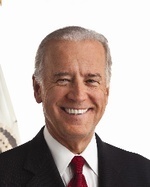 Wikimedia
Wikimedia Joe Biden
Who is he? Biden, a longtime Delaware senator, is vice president and foremost American advocate for aviator sunglasses and passenger rail.
Is he running? He won't rule it out, but he's made no serious steps toward a run.
Who wants him to run? Joe Biden, maybe. The group Draft Biden (slogan: “I’m Ridin’ With Biden”) continues to do its best.
Can he win the nomination? If Clinton didn't run, it would throw the Democratic field into disarray. But probably not.
When will he announce? It seems ever more likely that he won't.
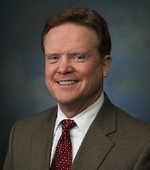 Wikimedia
Wikimedia Jim Webb
Who is he? Webb is a Vietnam war hero and secretary of the Navy. The author of several books, he served as a senator from Virginia from 2007 to 2013.
Is he running? He has launched an exploratory committee.
Who wants him to run? Dovish Democrats; socially conservative, economically populist Democrats; the Anybody-But-Hillary camp.
Can he win the nomination? Probably not.
Does his website have a good 404 page? No.
 Wikimedia
Wikimedia Elizabeth Warren
Who is she? Warren has taken an improbable path from Oklahoma, to Harvard Law School, to progressive heartthrob, to Massachusetts senator.
Is she running? No. Seriously, no.
Who wants her to run? Progressive Democrats; economic populists, disaffected Obamans, disaffected Bushites.
Can she win the nomination? No, because she's not running.









Hillary Clinton's Fainthearted Populism

You may have heard that Hillary Clinton, in launching her campaign over the weekend, gave a speech marked by class-warfare themes. The New York Times said she issued “a populist promise to reverse the gaping gulf between the rich and poor.” Politico said “her economic-inequality rhetoric could have been comfortably uttered by the likes of Elizabeth Warren,” the crusading liberal senator from Massachusetts. Not (ever) to be outdone, the New York Post featured her on its cover in full Sherwood Forest drag, under the headline “RODHAM HOOD! Hillary reboots campaign with attack on rich.”
But here is what Clinton actually said:
You see corporations making record profits, with CEOs making record pay, but your paychecks have barely budged. While many of you are working multiple jobs to make ends meet, you see the top 25 hedge fund managers making more than all of America’s kindergarten teachers combined—and often paying a lower tax rate….
Prosperity can’t be just for CEOs and hedge fund managers. Democracy can’t be just for billionaires and corporations….
The financial industry and many multinational corporations have created huge wealth for a few by focusing too much on short-term profit and too little on long-term value—too much on complex trading schemes and stock buybacks, too little on investments in new businesses, jobs, and fair compensation….
Republicans trip over themselves promising lower taxes for the wealthy and fewer rules for the biggest corporations without regard for how that will make income inequality even worse... They pledge to wipe out tough rules on Wall Street, rather than rein in the banks that are still too risky….
The middle class needs more growth and more fairness. Growth and fairness go together.... There are allies for change everywhere who know we can’t stand by while inequality increases, wages stagnate, and the promise of America dims….
[We should] reward businesses who invest in long-term value rather than the quick buck, because that leads to higher growth for the economy, higher wages for workers, and yes, bigger profits—everybody will have a better time. I will rewrite the tax code so it rewards hard work and investments here at home, not quick trades or stashing profits overseas.
Here are some things Clinton didn’t say: She didn’t directly call for higher taxes on the rich. She didn’t directly blame Wall Street or financial deregulation for the economic crisis. (In fact, she mentioned Wall Street and banks just once in the speech.) She didn’t say, as Warren frequently does, that “the game is rigged” against ordinary Americans. She didn’t mention the gap between rich and poor at all, and her two mentions of inequality (both quoted above) were indirect. CEO benefits and hedge-fund salaries weren’t directly attacked, but used as a point of contrast. Rather than rage against the perfidy and greed of the rich and powerful, as Warren routinely does, or insist that economic villains must be punished, Clinton posited that a better economy could lift all boats—that under her policies, “everybody will have a better time.”
This may seem like a subtle distinction, but it’s at the crux of the economic debate on the left. Economic liberals like Warren, New York Mayor Bill de Blasio, and economist Joseph Stiglitz believe inequality is structural, the result of rules and policies that benefit those at the top. The other side—centrist Democrats like New York Governor Andrew Cuomo, Delaware Governor Jack Markell, and John Delaney, a Democratic congressman and former financier—prefers to blame the wealth gap on globalization and technological advances.
There are, after all, two ways to fix inequality: You can lift up those at the bottom—or you can bring down those at the top. The centrists think you can narrow inequality just by lifting those at the bottom, by hiking spending on social programs and infrastructure. They believe addressing inequality doesn’t necessitate raising taxes, reining in big business, or punishing greedy CEOs. But the Warrenites think you can't fix the problem unless you do both at once—lift those at the bottom and bring down those at the top.
Stiglitz—a Nobel Prize winner, former World Bank chief economist, and former chairman of the Council of Economic Advisers under President Clinton—explicitly argued the case in a speech at the National Press Club last month, at an event hosted by the Roosevelt Institute and headlined by Warren and de Blasio. “What are the underlying drivers [of inequality]?” he asked. “A lot of people say things like globalization, technology. But those things, globalization and technology, are global.” Yet the United States has by far the lowest equality of opportunity of any advanced country, he said. “What does that tell us? ... It’s about policies—policies and politics.”
The report that Stiglitz authored for the Roosevelt Institute is called “Rewriting the Rules of the American Economy.” The bulk of its recommendations concern what it calls “Taming the Top”—bringing Wall Street and economic elites to heel through a slew of new taxes, regulations, and incentives. “The Dodd-Frank Act was an excellent start,” the report states, “but the legislation did not change the structure of the dysfunctional system. Further reform can and should reduce the risks of the financial sector to the economy as a whole.”
Clinton tiptoed up to some of these ideas in her speech, but she stopped short of embracing them. Echoing Stiglitz, she said global forces weren’t solely to blame for middle-class economic difficulty: “Advances in technology and the rise of global trade,” she said, had “displaced jobs and undercut wages”—but “the choices we’ve made as a nation, leaders and citizens alike, have also played a big role.” Nonetheless, for those anxious to “tame the top,” Clinton offered precious little.
Some on the left worry that this is intentional—that Clinton purposely left herself wiggle room for a set of economic policies that will seek to lift the middle class without troubling Wall Street much. Saying, as Clinton did, that everybody will be better off “refuses to pick a side when some interests are against others—namely, when big corporations are trying to hurt workers or consumers,” Adam Green, cofounder of the Progressive Change Campaign Committee, told me. “This unwillingness to name villains and say publicly that someone will have to lose power is what really worries progressives.”
Based on the way the speech has been received, Clinton appears to be getting credit for a populism she didn’t really espouse. While she spoke on Roosevelt Island, her rhetoric of shared prosperity was a far cry from that of F.D.R, who called out monopolists, reckless bankers, and profiteers as “enemies of peace,” and declared, “I welcome their hatred.” In fact, the most populist line in Clinton’s speech may have been one she didn’t write. Quoting F.D.R., she called for “the ending of special privilege for the few.” The audience of loyal Democrats erupted in cheers. It was one of the biggest applause lines of the speech.









Atlantic Monthly Contributors's Blog
- Atlantic Monthly Contributors's profile
- 1 follower



